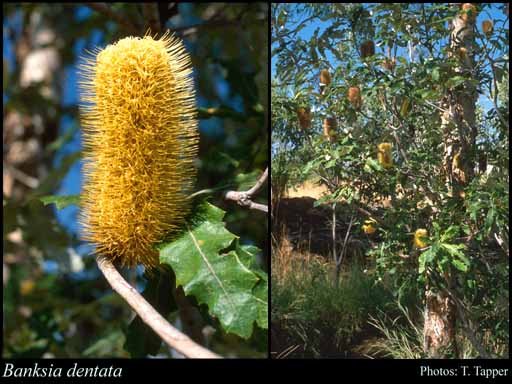- Reference
- Suppl.Pl. 127 (1782)
- Conservation Code
- Not threatened
- Naturalised Status
- Native to Western Australia
- Name Status
- Current
Tree, 2.5-8 m high, with epicormic buds. Fl. yellow/cream-yellow, Nov to Dec or Jan to Jul. Skeletal soils over sandstone or quartzite, seasonally moist. Rocky slopes, creeks, gorges.

Scientific Description
Trees, 3-8 m high; branchlets glabrous or hairy. Leaves petiolate, alternate, 100-230 mm long, 25-60 mm wide, hairy; petiole 25-35 mm long; lamina flat, clearly widest above the middle, once divided, pinnately divided, shallowly divided, teeth pointing outwards, with 12-19 lobes on each side, the margins flat. Inflorescences tomentose (with matted or tangled, soft, woolly hairs), yellow, hairy. Perianth 24-33 mm long, hairy, all over, limb apex pubescent (with soft, straight, erect hairs), without awns; pistil 35-40 mm long, straight, style glabrous. Follicles glabrous or hairy, pilose, elliptic, 15-20 mm long. Flowers in January, February, March, April, May, June, November or December. Occurs in the Northern (N) Botanical Province(s), in the Northern Kimberley (NK), Victoria Bonaparte (VB), Central Kimberley (CK) or Ord-Victoria Plains (OVP) IBRA subregion(s).
Distribution
- IBRA Regions
- Central Kimberley, Darwin Coastal, Northern Kimberley, Ord Victoria Plain, Victoria Bonaparte.
- IBRA Subregions
- Berkeley, Hart, Keep, Mitchell, Pentecost, Purnululu.
- IMCRA Regions
- Kimberley.
- Local Government Areas (LGAs)
- Derby-West Kimberley, Halls Creek, Wyndham-East Kimberley.